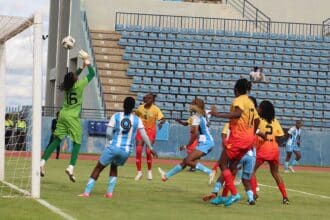Reflecting on the media’s contribution to democracy in Botswana since 1966
The University of Botswana Library auditorium was filled with mixed emotions and reactions on Thursday evening, as various speakers each shared their sentiments on how effective the media has been in its role as the fourth estate of democracy.
The panel discussion was a collaborative effort between MISA Botswana Chapter and Friedrich Ebert Stiftung Botswana to scrutinize Botswana media’s impact in the maintenance and promotion of democracy over the past 57 years. The interesting dialogue was moderated by media practitioner Kealeboga Dihutso who led an insightful conversation along with panelists Tryphinah Kenalemang (Weekend Post Director), Dr Allen Munoriyarwa (UB Media Academic), Thapelo Ndlovu (Media Expert) and Sonia Gaobolae (Advocacy and Communications Manager at Botswana Centre for Public Integrity).
Media Expert Thapelo Ndlovu’s main talking point was on inclusion as a synonym to democracy. “We must first look into whether we have inclusion in Botswana, focusing the scope on factors such as participation, accountability, association and engagement.”
These all according to Ndlovu, emanate from freedom of expression which should be facilitated and manifested through the media.
He went on to compare state and private media and their contribution to the country’s democracy. “State media was primarily set up to defend the state and in their duty, they have lost a chunk of their responsibility as media including advocacy and facilitating debates.”
“On the contrary, the bottom-line for private media is profit which tends to override their responsibility to report fair and objective news,” he said.
Adding on, Media Academic Allen Munoriyarwa said the right kind of media that promotes democracy is a media that unites people, holds those in power accountable and also fights for social justice.
For her part, BCPI’s Sonia Gaobolae commended the media for their work in exposing corruption especially in the 90s. “Our organisation would not exist hadn’t the media shone a light and uncovered corruption,” she said, urging the state media to do better in terms of holding those in power accountable.
Finally, Weekend Post Director Tryphinah Kenalemang spoke on the commercial aspect of the media and how it marries with the editorial department, enabling it to advocate for democracy.
She stressed the importance of maintaining credibility and ensuring that content isn’t compromised for the benefit of advertisers.
While the room was divided with different opinions, all the attendants agreed that there was still much room for improvement in terms of how the media functions to promote democracy in Botswana, with suggestions for media to challenge binding legislations more aggressively and to develop newer business models to reduce dependency on advertising revenue.







